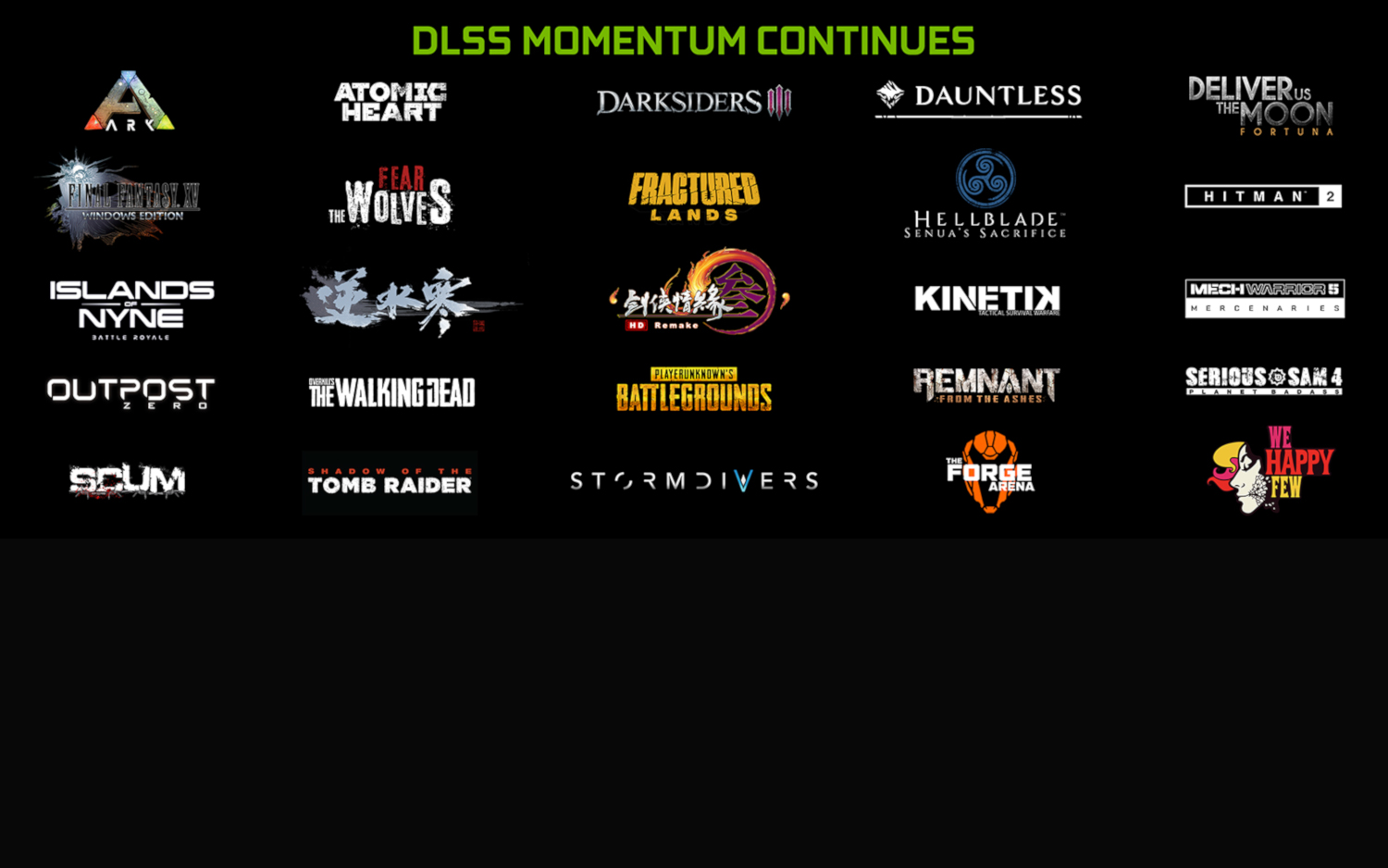Nvidia RTX's DLSS Roster Gets Nine New Games
Much of Nvidia's messaging around the RTX graphics cards based on its Turing GPUs has revolved around ray tracing. That isn't the only new technology debuting alongside the next generation of GPUs, however, and features like Deep Learning Super Sampling (DLSS) are likely to have a strong impact on recent games as well. To wit, Nvidia announced that nine more titles will support the secretive tech.
Nvidia hasn't shared many details about how exactly DLSS works. As its name implies, the tech is a new form of super sampling that uses AI to improve a game's image quality by increasing the resolution of its video output. It's supposed to obviate the need for anti-aliasing too, with Nvidia claiming RTX cards with DLSS enabled will run "up to 2x faster than previous generation GPUs using conventional anti-aliasing techniques."
The company's benchmarks of the RTX 2080 do show improved performance if DLSS is enabled while anti-aliasing is disabled. But not all of this can be attributed to DLSS--some of it also results from the changes between the Pascal and Turing architectures. We also don't know at what settings the games were benchmarked, so until we get them in our test suite, we'll have to consider Nvidia's results promising but unproven.
Either way, developers seem keen to add support for DLSS to their games. Nvidia announced the feature with 16 compatible games that ranged from the indie battle royale Islands of Nyne to the decidedly not-indie Final Fantasy XV: Windows Edition. The feature is expected to be used mostly by AAA titles, but the initial list and the new games show that Nvidia isn't limiting DLSS to big developers.
Here's the list of additions:
- Darksiders III
- Deliver Us The Moon: Fortuna
- Fear The Wolves
- Hellblade: Senua's Sacrifice
- KINETIK
- Outpost Zero
- Overkill's The Walking Dead
- SCUM
- Stormdivers
Nvidia said in today's announcement that we can expect to hear "much more" about DLSS, ray tracing and other GeForce RTX features in the coming weeks. As the company partners up with devs to support RTX technologies in upcoming titles rather than updating existing ones--as seen with ray tracing support in Battlefield V--don't be surprised if more DLSS-compatible games are revealed.
Get Tom's Hardware's best news and in-depth reviews, straight to your inbox.

Nathaniel Mott is a freelance news and features writer for Tom's Hardware US, covering breaking news, security, and the silliest aspects of the tech industry.
-
IceMyth I am going to buy Darksiders III and play it on my RX 580 lol...I've been waiting for this game for years!Reply -
JTWrenn Until I see real world testing, especially on power, heat, and noise...it doesn't matter. The fact that the embargo lasts so long gives me pause.Reply -
jimmysmitty Reply21317913 said:Until I see real world testing, especially on power, heat, and noise...it doesn't matter. The fact that the embargo lasts so long gives me pause.
As should anyone even when it seems too good to be true.
The one thing though is the features of this card seem tempting. Its not so much the performance for me at this point, I am happy where I am with my 1080 but the features sound interesting and have a bit of pull on my curiosity. -
cryoburner ReplyIt's supposed to obviate the need for anti-aliasing too, with Nvidia claiming RTX cards with DLSS enabled will run "up to 2x faster than previous generation GPUs using conventional anti-aliasing techniques."
By "conventional anti-aliasing techniques" they seem to be exclusively referring to super-sampling, compared to which virtually every other anti-aliasing technique is already substantially faster. 2x faster than super-sampling would still be significantly slower than other techniques like MSAA or the post-process effects that have been more commonly used in recent years. So, it sounds like it's more a matter of providing an antialiasing method that offers quality somewhere between those other techniques and super-sampling at a performance level that is also somewhere between the two. -
Lucky_SLS Few of the those games are already released, which means DLSS can be enabled with just a big sized patch to those games?Reply -
jaber2 people who could afford the $1200 price tag for the Ti version have already pre-oredered on, I on the other who already have the 1080Ti don't plan to shell out the money at this time for a 20% speed improvementReply -
BaRoMeTrIc Reply21317913 said:Until I see real world testing, especially on power, heat, and noise...it doesn't matter. The fact that the embargo lasts so long gives me pause.
The fact they won't even give reviewers drivers to test yet is crazy. i bet besides ray tracing and dlss these cards offer little more than 10-15% improvements over pascal, and thats not worth the $300-500 premium. These people selling their 1080's and 1080 ti's to upgrade are going to be disappointed.
